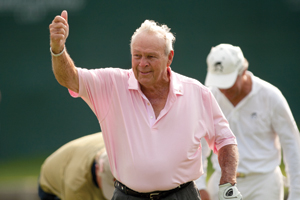The following is an excerpt of “Arnold Palmer’s State of the Game,” a new regular column at GolfChannel.com that was provided exclusively to SportsBusiness Journal. To read the column in its entirety, go to www.GolfChannel.com.
I have been around the game of golf since I first hit a ball when I was 3 years old. That was 80 years ago. I still have interests in golf course design, course ownership and so on, but I haven’t really played competitive golf for quite some time. So as 2012 comes to an end, I’m seeing the game as you do: as a casual player, as a fan and as a businessman. And I like what I see.
This year marked an important but painful anniversary for me. A half-century ago, I lost the U.S. Open in an 18-hole playoff to a young up-and-comer named Jack Nicklaus. That was an agonizing loss, but with a half-century of hindsight it’s clear to me that such challenges are the key to growth. This is as true for athletes as it is for businessmen, and as true for sports as it is for industries. Look at our own game. Golf has been kicked around some in the last few years. Whether it was the glut of golf courses; the damage of a Great Recession, during which politicians rushed to make the sport a scapegoat; or the soft television ratings from a few years ago, the game has faced its share of tests.
As we look back on 2012 and into the future, however, I see an increasingly vibrant and healthy game emerging from those examinations. It doesn’t take a scratch player to be moved by Bubba Watson’s personal story, his daring style and his gutsy Masters win. The rest of the major champion class of 2012 — Webb Simpson, Ernie Els and Rory McIlroy — underscore the global reach of our game and the lasting appeal to both young and old.
At the amateur/club level, the game is stabilizing as well. According to the National Golf Foundation’s latest available figures, 25.7 million Americans played at least one round of golf in 2011. Of course, in these tough economic times, players are leaving the game. One underlying sign of golf’s strength: Even with the ebb in golfers, rounds played in 2012 are up 7.4 percent over 2011, the biggest one-year increase since the turn of the century.
Staying with that grassroots theme, I marvel at what The First Tee has accomplished. In the first 14 years since its founding in 1997, The First Tee has positively impacted the lives of more than 6.5 million youngsters. By 2017, the organization expects to influence an additional 10 million youngsters. That’s inspiring.
 |
Palmer looks forward to golf’s return to the Olympics, led by the game’s global growth.
Photo by: GETTY IMAGES
|
The game’s vibrancy is evidenced in television, too. Who would have guessed that Golf Channel, only 17 years old, would be the fastest-growing network on television? As a founder of the network with my partner Joe Gibbs, I take great pride in that. For those who are convinced that Tiger Woods must win tournaments in order for televised golf to thrive, consider this: 2011, a year in which Tiger did not win a single official money event, was the most-watched year in Golf Channel’s history. That momentum at Golf Channel continued into 2012, which is shaping up to top 2011’s numbers and set a new mark for viewership.
Today, however, the game is as global as can be. In November, a 14-year-old from China named Tianlang Guan won the Asia-Pacific Amateur and earned a spot in next year’s Masters. He’ll be the youngest contestant in tournament history. Think of the impact that alone will have on golf across Asia in 2013 and beyond.
The men are not alone. As the year comes to an end, we celebrate genuine global female stars as well, hailing from places as diverse as Chinese Taipei, Korea, Norway, Japan, the U.S. and, again, China. All of this bodes well for golf’s well-earned, long-awaited return to the Olympic Games in Rio in 2016. Oh, to be young again! What a thrill it would have been for me to represent my country in the Olympics.
Do we have issues? Sure. What truly global enterprise doesn’t? We need to keep bringing the game to youngsters and women. We need to address the distance that today’s ball travels. Slow play is turning time-starved people away from the sport. We need to encourage nine-hole rounds. We have environmental concerns to deal with and we have to keep a vigilant eye on the standards of sportsmanship that set our game apart. The U.S. Golf Association and R&A recently announced a ban on the practice of “anchoring” clubs — usually a long or belly-length putter — against the body. I applaud them for not only their ruling, but also for the patient and thoughtful approach they took, studying the issue for years and across all levels of golf before making their decision. There was nothing knee-jerk about it. The game is in good hands.
Golf has been played for the better part of 600 years, and while the men and women who play it may age with every passing season, the game has an uncanny way of renewing itself. As I write this, dozens of hopeful tour players — the next wave of stars and major champions — are sweating out the final stage of Q School. Thousands of miles away, on the other side of the Atlantic Ocean, purists and modernists are heatedly debating changes to the treasured Old Course at St. Andrews. Meanwhile, in Asia, a 14-year-old boy is months away from his first breath of Augusta’s spring air. It doesn’t get any better than that.





